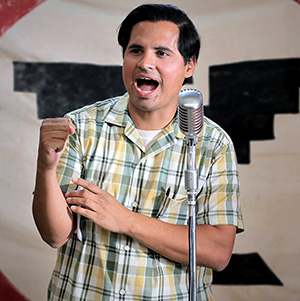

It was a miracle Cesar Chavez was made, with a net of international financing that included Abu Dhabi and the Mexican state of Sonora. The state doubles as the San Joaquin Valley; the matchup is perfect. No one could have gotten as much movie on such a low budget as director Diego Luna did. There was some help from executive producer John Malkovich. He plays—with much diabolical sabor—a fictional Croatian grape grower in Delano who considers his striking Mexican laborers “children.”
Unfortunately, the San Jose years don’t fit into this bio. It follows Chavez from his Community Service Organization days in Los Angeles in 1962, to the march on Sacramento and the conclusion of the grape-strike in 1970. As Chavez, the Mexican-American actor Miguel Pena gives a winning, complicated performance: he demonstrates the contradictory force and gentleness that made our local hero a worldwide legend. He also shows the abruptness that came out when Chavez was contradicted—the sudden expulsion from the union of a laborer after he gets into a fight with growers’ thugs and the equally sudden announcement of a hunger strike to demonstrate his non-violent revolutionary principles.
Naturally, the movie doesn’t show Chavez’ decline: the union purges, the Synanon gaming or the subsequent hunger strikes that wore out Chavez’ body before his time. At least Pena shows how that decline was going to happen, and that’s as much as we can hope for sometimes. It’s significant that most of the biographies of Chavez in the general collection of the San Jose library are in the children’s department. Chavez is still in the halo stage every important historical figure goes through.
After two rousing acts of the rise of the workers, the movie starts to go a little haywire. There’s no good visual way in a movie to make a hunger strike look anything but petulant and passive-aggressive, even when Steve McQueen showed us the death of Bobby Sands in Hunger.
When Chavez takes to his bed and refuses to eat, we don’t see what his wife Helen (America Ferrera) had to say about it, even though this film takes time away from the political struggle to deal with stresses in Chavez’s large family. Helen is characterized as a serious fighter—Ferrera has a fine scene burbling about how much she enjoyed being in jail—but after the first hunger strike pops out of nowhere, she seems to have nothing to say about it. As for Dolores Huerta (Rosario Dawson), she’s there to be a witness to history, and a right-hand person: her most important task in the film is intercepting a phone call.
So, Malkovich. He skulks around brilliantly as the grower “John Bogdanovich” (Peter Bogdanovich gave Pena an important early role). The sublime actor, with his boar’s eyes and his eerily-white teeth, is no doubt here for political reasons, like Brando turning up in the anti-apartheid film A Dry White Season. The uninflected Spanish Malkovich speaks to his field hands sounds as menacing as Klingon. Yet he keeps our dirty sympathies as a self-made man. This Bogdanovich serves as our liaison to bigger names, the insurgent Republicans of ’68—Ronald Reagan and Richard Nixon, Californians who played their part in lengthening the grape strike just as Robert Kennedy (Jack Holmes) helped bring news of the strike back East.
Diego Luna (of Y Tu Mama Tambien) directs in a style that’s becoming an indie-movie hobgoblin, following the retirement of its pioneer Steven Soderbergh. Someday, the indie-movie shaky closeup and the lonesome electric guitar chord—just as MGM had its lion’s roar, IFC has its wobbly guitar kerang—is going to look as dated as three-point lighting and actors in suits and hats. The movie stays modest, indirect. Luna has its most ringing dialogue in voiceover: “I live in a world where a man who picks fruit and vegetables can’t feed his family.” Sometimes a film is best in the way it represents the viability of a bigger movie farther down the line.
101 MIN; PG-13



